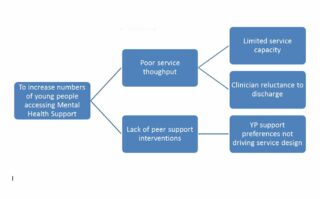Q Exchange
Evaluating and scaling peer support work in CAMHS
- Idea
- 2018

Meet the team: Redbridge CAMHS peer support
Also:
- Jeni Page - ithrive project manager
Peer support roles in children’s mental health services can play a significant role in supporting both the young person’s own recovery and the recovery of other people. An evaluation of the impact of a peer support programme in Nottingham Health Care NHS Trust found that peer support workers contributed to a 14% reduction in inpatient stays among the clients they worked with, saving around £260,000. Young people themselves often report that they would prefer to talk about their problems with people their own age, and that they would like to be able to access mental health support in a range of settings – not just a clinic.
Currently there are several groups which have recently been set up, or are planned to be set up, across NELFT’s (North East London Foundation Trust) Child and Adolescent Mental Health Services. It is hoped these groups will have a similar positive impact on young people involved and enable efficiencies in service delivery. However the groups do not currently have a robust evaluation plan.
The idea we are pitching to Q Exchange has two parts:
-
A robust evaluation of the groups to gain an in depth understanding of their impact
-
Testing the delivery of groups in community settings such as youth centres to see if these better meet the needs of young people who attend, whilst also strengthening relationships between agencies in the local system
Phase one:
Phase one would involve a rapid evaluation of four cycles of groups in one service. In total this would mean we will have gathered baseline data from 20 – 30 young people.
The following measures would be considered:
- Outcome Measures:
-
Impact on the young person experience (collected via interviews)
-
Service throughput (waits, and numbers accessing treatment)
2. Balance Measure: Engagement with service (DNA)
- Process measures: onwards referrals, re-referrals, discharge, and any Routine Outcome Measures collected
A CAMHS clinician would be seconded into the NELFT QI team for one day a week for four to five months to: plan and develop a data collection and analysis plan, to oversee collection of data including liaison with NELFT performance team and conducting of interviews with young people, data analysis, and coordination of feedback loop back to the service re: the impact of the groups.
Dissemination of the findings of the evaluation with be communicated to all NELFT CAMHS services to ensure the learning can help inform work they are undertaking.
Phase two:
Building on the results of the evaluation, phase two would involve testing of the groups in local community settings, for the service with whom the evaluation was undertaken. This would involve; liaison with local providers such as youth centre and schools to find the most appropriate venue as guided by the young people, the coordinating and set up the groups, and planning for any adjustments needed to the measurement framework. The seconded clinician will continue for one day a week to coordinate this work for a further five months. They will be mentored by a QI expert from the NELFT QI team to ensure the ongoing testing and learning of the groups is embedded throughout the processes.
Phase two will also ensure that CPD for the clinicians delivering the peer support groups will be embedded into processes and that a bank of materials are developed to enable other clinicians to deliver the groups in the future. As with phase one dissemination of learning will be embedded into the phase so other services can learning from the model being testing here. Unlike phase one this will be done through out the phase as opposed to waiting till the final results are available.
This evaluation and improvement project sits within a wider programme of work called i-THRIVE which is aims to change delivery children’s mental health services in a way that is both led by the needs of young people in the context of their lives and is integrated with other services. Peer support is an important element of this work because if the patient centred nature of the work, and the opportunity for working in a different way with partners in the community.
How you can contribute
- • Support our project
- • Share ideas and thoughts about the project
Further information
ithrive summary (PDF, 64KB)
Comments
Ann Innes 18 Jun 2018
Hi - I'm very supportive of anything that allows young people greater access to mental health support of any form so a couple of thoughts I had in relation to the idea were:
I am wondering whether your bid is more about increasing accessibility of support ( placing it outwith clinical settings) rather than enabling peer support per se?
Mention of the clinician "delivering" the group makes me want to know more about how the peer support aspect will operate. I think adding in a bit more detail around that would help clarify the peer led aspect of the work
Hawys Tomos 31 May 2018
Hi! Great to see your peer support bid here. I wonder if you’ve seen the Q Lab essays, which were published yesterday? You might find the second essay, ‘learning and insights on peer support’, particularly useful – there’s a section on ‘evidence and measurement of peer support’. The references also include many useful resources. Here’s the link: https://qlabessays.health.org.uk
Comments are now closed for this post.